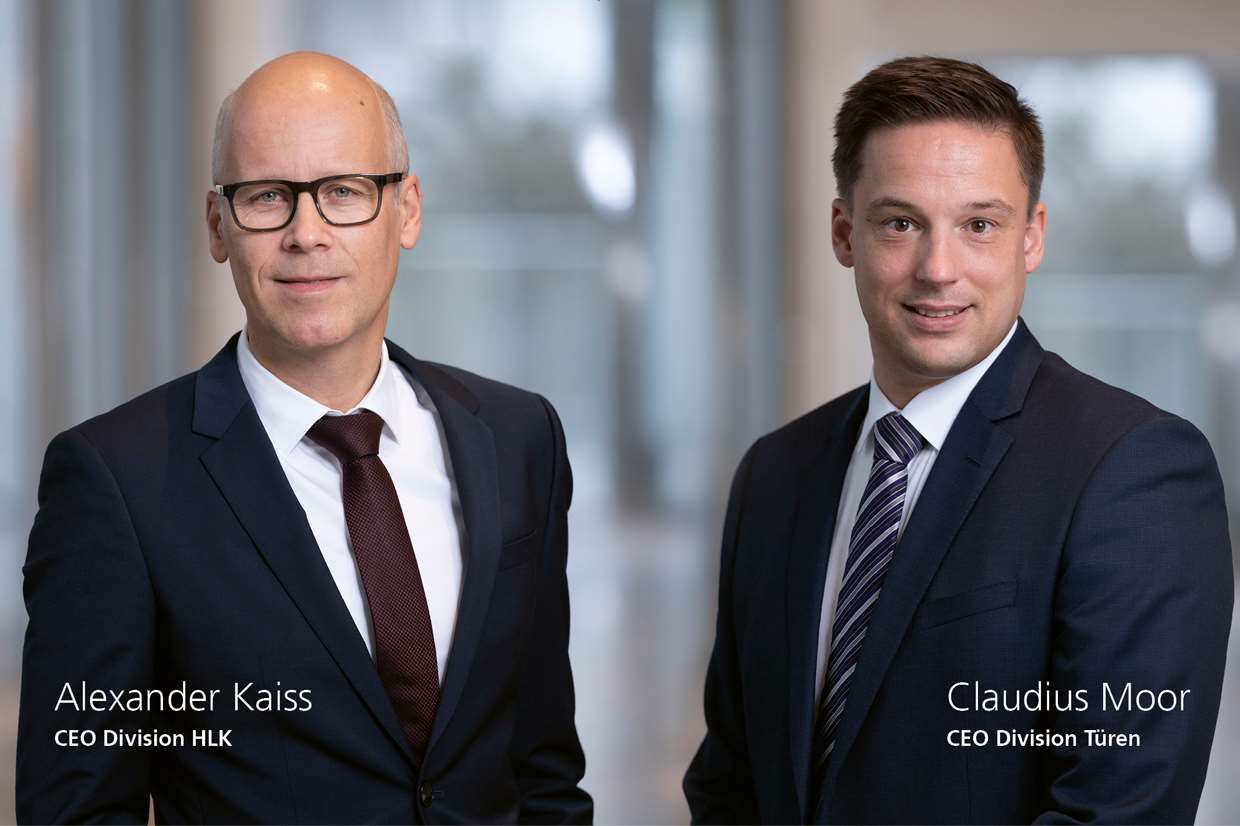A look behind the scenes
Alexander Kaiss (AK) and Claudius Moor (CM) provide an insight into what they think about sustainability, the challenges that they face in this regard, and how they deal with them.
How sustainable has your day been so far?
AK: All in all, the day has already been quite sustainable. I have already been jogging – instead of pursuing an environmentally harmful hobby such as motorbike riding, for example. In addition, I have refrained from printing out the 140-page Group Management documents. However, I have to confess that I will be driving my car to our largest Swiss customer for heat pumps, which is not that sustainable, of course. Since heat pumps greatly contribute to sustainability, I have a somewhat less guilty conscience, though. And I am already travelling through Switzerland anyhow and not making a special trip for this appointment.
CM: If you also consider employee satisfaction to be part of sustainability, then my day started very positively. I have already jogged for an hour, enjoyed the tranquility of nature, and prepared myself mentally for the working day. I believe that sustainable corporate management requires not only an outward responsibility towards society and the environment, but also an inward responsibility towards a company's own employees. In my opinion, it is not just about conserving resources but also about not "consuming" people.
Afterwards, I had a good conversation on the topic of "sustainable doors with a much lower CO2 footprint". We are testing various sustainable materials that would greatly reduce the burden on the climate. As the European market leader in the doors area, we feel that it is our duty to constantly check our products for improvement potential, especially in regard to their sustainability.
In what direction do you think the construction industry will develop in respect to sustainability?
AK: Legal regulation will play a great role. The European-wide direction is to reduce greenhouse gas emissions. Among other things, this can be seen in the definition of new construction standards that lead to buildings being significantly better insulated in the future, which in turn reduces heating requirements. The result is that no fresh air is exchanged through leaks, which is why the ventilation needs heat recovery. And we are fully on top of this. The energy that is still needed in a well-insulated house, we want to generate this as sustainably as possible with our products – namely with a heat pump, which is ideally powered only with green electricity.
CM: To my regret, certified sustainable wood-based materials have not prevailed in project tenders as I had hoped. Nonetheless, we use sustainable, certified materials in our doors. We are noticing a stronger focus especially on CO2-neutral production and on Scope 3, in other words, the emissions that result from upstream and downstream activities. The supply chain must be reviewed in this respect, because customers want sustainable products and also demand this from us. Arbonia will be investing EUR 50 million in sustainable energy supply in the Doors Division alone, among other things in CHP plants at Prüm and Garant as well as in the frame production at Prüm. This is essential. I think that this will result in a natural consolidation of the competitive environment, because companies that are not investing in their sustainability today will have difficulty in the future.
What effect does this development have on the sustainability of your division or your products?
AK: This development has an extremely positive effect on the sustainability of our division. We have always said that there are two big megatrends that drive our business: on the one hand, the issue of CO2 neutrality or CO2 reduction and on the other hand, a healthy indoor climate. We are optimally positioned with our heat pumps, residential ventilation, heat and energy stores, as well as underfloor heating and efficient radiators. We recognized these trends early on, laid the foundations accordingly, and are now profiting from this.
CM: At our German door companies Prüm and Garant, the investments in new combined heat and power plants (CHP) are very important. In the future, the production residue of the sites (in this case wood dust, chopped wood, and so-called flakes) will be converted into energy in these plants, and the energy released in the process will be used for heating and, with the aid of a turbine, for power generation. As a result, we have effective CO2 savings.
Looking inwards is also very important at our division. Employee satisfaction is gaining importance as a pillar for sustainable success, because in this day and age, well-trained skilled workers are scarce and replacing employees who leave the company is expensive.
What are the most important issues and milestones in your division in respect to sustainability in the reporting year and in the coming years?
AK: Our entire product range will significantly contribute to sustainability for customers. As Arbonia, we also have to do everything that we can to manufacture the products as sustainably as possible, thanks to our production processes. Otherwise, it would be counteractive. For this reason, we have invested a lot in new technologies: servo motors for presses, for example, that use significantly less energy per se with the same output. This is the first building block, and the second is naturally that we are gradually moving towards producing this energy as renewably as possible or buying it green. What does producing renewably mean? For this purpose, in the HVAC Division we are currently also investing in a CHP plant in Plattling (D), for example, and in other projects that will bring us closer to our goal.
CM: An important milestone is the commissioning of the previously mentioned CHP plants as well as issues concerning environmentally friendly packaging options. The latter is becoming increasingly important because the disposal costs for packaging are becoming more and more expensive.
To further increase our attractiveness as an employer and thus reduce the already very low fluctuation, we will be further improving the training and development of employees and apprentices.
The topic of sustainability is omnipresent. To what extent do you notice this among your employees and customers?
AK: I find that customers as well as employees are paying more and more attention to the topic. Customers are asking more intense questions, and I am convinced that customers would like to buy as environmentally friendly as possible. Employees also prefer to work at a company that is committed to sustainability. At works meetings and via infoterminals, we inform our employees about what we are doing and that we are setting CO2 reduction goals for ourselves, for example. This also helps us to be perceived as an attractive employer.
CM: We sense an increased interest in demonstrable sustainability on the part of our customers. They see that we are aware of our ecological and social responsibility as a company and are specifically investing in sustainability. This is directly reflected in the economic performance of our division.
Assuming that money were not an issue: What all would you do in the area of sustainability?
AK: If money were not an issue, then we would pursue the goal of operating CO2-neutral production plants very quickly. Today, we are able to cover around 10 – 20% of our energy requirements ourselves with our photovoltaic systems and other technologies. With even more financial resources, we could dramatically accelerate our efforts to generate 100% climate-friendly ourselves. From a purely technical view, that would be possible. But at the end of the day, we have several sustainability goals that we would like to achieve as a company. These include wanting to grow profitably and creating added value for shareholders. Therefore, we cannot just act in one direction but have to operate in a stakeholder-friendly way. It thus makes sense for us to work in the way that we are now.
CM: In the future, we will cover 100% of our heat requirements for Prüm and Garant through our own production with the CHP plants. An expansion from 60% to 100% self-generated electricity is also desirable. I would increase the electricity production at all our sites through photovoltaic systems. This would bring us a big step closer to our goal of becoming completely CO2-neutral as a division.
I would also invest in CO2 capture and storage in order to compensate for the remaining CO2 emission or alternatively think about high-quality certificates.

